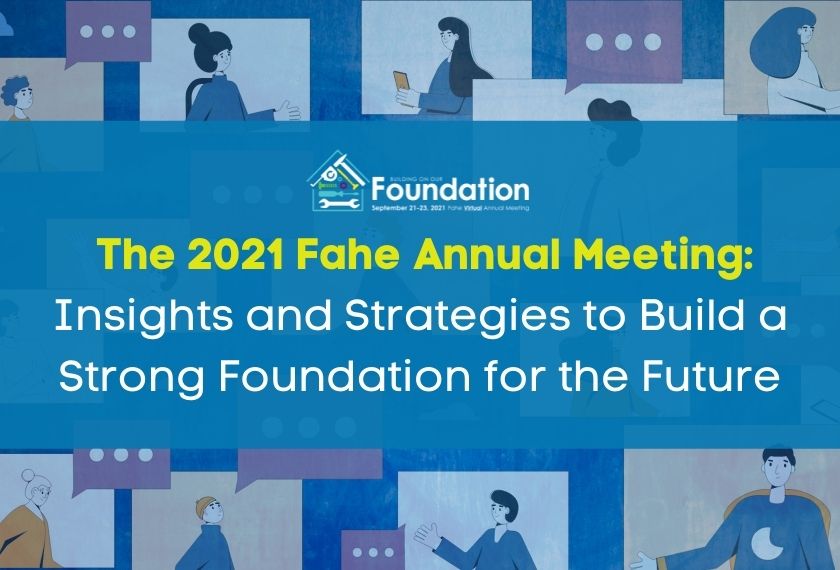
2021 Annual Meeting Offers Expert Insights and Tested Strategies for Fahe Members to Build a Strong Foundation for the Future
The Fahe Annual Meeting is traditionally a time for Fahe Members, partners, and stakeholders from across the region to gather with staff, thought leaders, and community and economic development experts to engage in thought-provoking conversations about strategies to reinvest in Appalachian prosperity. This year, the Fahe Network virtually assembled under a theme of “Building on our Foundation” to learn new tools and techniques for collectively helping our communities recover from the pandemic and take full advantage of new opportunities to emerge even stronger.
Day one kicked off on Tuesday, September 21st with inspiring remarks from Fahe’s board chair Karen Jacobson, who spoke about what it is like to work in the company of everyday heroes dedicated to uplifting those in need in their own back yards. Jacobson described how her organization, Randolph County Housing Authority, had recently worked with a local West Virginia mayor to provide shelter, food, and clothing to at-risk families facing housing insecurity. She asserted the basic human necessity of safe, sanitary housing and reflected on how, during a time of immense uncertainty and turmoil, she was proud to witness Fahe Members and their dedicated staff and volunteers answer their communities’ call for help and work each day to uphold the promise of the American Dream for every family.
Following Jacobson’s opening comments and updates from each of Fahe’s state caucus chairs, Fahe President and CEO Jim King opened his remarks by lauding Members’ perseverance during the extremely difficult circumstances wrought by COVID-19, emphasizing the importance of increasing investment in Appalachia. Specifically, King related Appalachia’s disproportionately low per-capita rate of investment and how it might be at least partially rectified through the $2 billion allocated for the region in the Infrastructure Investment and Jobs Act. King then turned his focus internally to Fahe’s robust financial and organizational performance despite the economic uncertainties during the pandemic. He spoke about Fahe’s record-setting year in philanthropic lending and investing, citing a delinquency rate below 3% as hard evidence of the durability of Fahe’s impact even during a market downturn. Most importantly, King invoked the importance of relationships, and the challenges of building and maintaining them in an increasingly virtual world, as the cornerstone of Fahe’s model for continued success. At its core, Fahe is a “relationship company,” he concluded, and the success or failure of any project or initiative can be determined by the strength of the relationships and the bonds of trust our Network builds in every community.
As the first day of the Annual Meeting drew to a close, Members heard from Donna Callejon, a seasoned corporate partnerships facilitator and the current Executive Lead for Disaster Response with the non-profit charitable investment clearinghouse Global Giving. Callejon spoke about the importance of philanthropy through locally-focused community leadership. She asserted that grassroots nonprofits around the world are well-positioned to know their communities’ specific needs and should seek to offer a certain degree of local expertise. Citing the advantages of Fahe’s on-the-ground perspectives from our Network of connected local leaders, Callejon underscored the need for non-profits to collect and distill their local imperatives into a single, clearly articulated vision that can serve as an identifying “North Star” for the organization’s long-term direction.
With attendees returning the next morning, Fahe Members were greeted by remarks from Ralph Perrey, Executive Director of the Tennessee Housing Development Authority (THDA) and dedicated fellow advocate and valued partner in the campaign to restore Appalachian prosperity. Perrey likewise reflected on the value of his organization’s years-long relationship with Fahe, welcoming opportunities for collaboration and mutual assistance in directing rental, housing, and utility assistance to struggling households. With the lingering effects of the pandemic still injecting uncertainly into family budgets, he reiterated the urgency of identifying those most at-risk of housing insecurity and leveraging federal investments to financially intervene and prevent potential homelessness. In order to overcome the capacity bottlenecks that have slowed the response of many public-sector housing agencies, Perrey pledged his intent to deploy $8.1 million for nonprofits to assist with outreach and intake. Fahe Members, he determined, would be key partners for THDA in disbursing funds and administering those outreach initiatives.

The second day continued with remarks from Appalachian Regional Commission (ARC) Co-Chair Gayle Manchin. Noting “ARC is built around partnerships and collaboration, just as Fahe is,” Manchin offered her praise for Fahe’s Member-oriented local approach. She commended the Network for putting its focus on the people of Appalachia and for utilizing hard capital projects as the physical foundation for building enduring opportunity in communities that often feel left behind. “It’s not just about buildings of brick and mortar, but it’s about how you build lives and fulfill those dreams,” Machin explained.
Manchin laid out how ARC is similarly prioritizing its investments in the people of Appalachia, starting with an intentional approach to workforce development and leadership incubation. She detailed the imperative of addressing opioid and substance use dependence among workers in the region, committing to help recovering individuals re-enter the labor force by dispersing $9.4 million in treatment, therapy, and training grants. To illustrate, she pointed to the example of Brooke’s House, a social enterprise program that offers women recovering from drug or alcohol dependency therapeutic support while they create and sell chocolate candies and offer pet grooming services. Manchin further explained her vision for supporting leadership development with the Appalachian Leadership Institute, a 9-month ARC-administered program to train local leaders in the strategies and best practices to advance economic vitality in their own communities. “If we work together,” she insisted, “we can find ways to build parity and equity across our region.”
After participating in thoughtful brainstorming and idea-sharing in a handful of small-group breakout sessions, attendees reconvened in the afternoon to hear from Ken Mall, Managing Director of Workforce Consulting for EDSI Consulting. In keeping with the theme of the annual meeting, Mall noted in his opening, “In today’s world, you need partners; you just can’t do it alone.”
Describing how EDSI helps vulnerable populations, such as single parents and the formerly incarcerated, get back into the workforce, Mall explained that job and career awareness is a crucial yet sometimes overlooked part of an effective workforce development program. He recommended that a community’s job opportunities be catalogued, inventoried, and succinctly explained to young learners starting as early as middle school. By incorporating career awareness earlier in students’ academic journeys, Mall insisted they would be more apt to pursue opportunities in their own back yards and retain their talents locally. “It’s really helping build the community’s awareness of those jobs, which will then lead to the demand for the schools to provide the training that they need,” he elaborated.
As presentations concluded for the second day, attendees gained valuable lessons on philanthropic development and non-profit giving strategies from Lisa Thomson, President and CEO of the American Chestnut Foundation, and her development guru Samantha Bowers. Explaining the importance of maintaining strong partnerships with existing and prospective funders, Thompson stressed the need to maintain regular communications with any organization’s charitable benefactors. She and Bowers helpfully outlined potential new ideas and strategies for Fahe Members to grow their fundraising operations and cultivate productive, mutually beneficial relationships with the philanthropic community to strengthen the financial capacity of the Network collectively.
For the third and final day of the annual meeting, Fahe Members heard insights on operational best practices and navigating organizational change from Brad Patrick, Executive in Residence at the University of Kentucky’s Gatton College of Business and Economics. With over 30 years of human resources and business leadership expertise at recognizable corporate brands including Delta Airlines, PepsiCo, Gillette, and others, Patrick discussed the need for establishing trust through competency, authenticity, and empathy while any organization undergoes change or seeks to improve its effectiveness. He further focused his remarks on the importance of inclusive leadership in organizational success, stressing that creating an atmosphere where everyone feels included often inspires employees and management to work more productively.
Finally, after another round of small-group breakouts, the annual meeting concluded with the Fahe Annual Awards ceremony to recognize the outstanding work of our most distinguished Members and their dedicated leaders during the year. Partnership Housing Executive Director Cassie Hudson and Clinch Powell RC&D Deputy Executive Director Sabrina Seamon opened the awards ceremony by winning the Fahe Award for Leadership due to their extraordinary accomplishments and powerful impact even in the face of unprecedented obstacles. Outstanding performance in the face of COVID-19 earned KCEOC Community Action Partnership and Southeast Rural Community Assistance Project the Award for Excellence, while Kentucky River Foothills Development Council also won the same award stemming from their innovative approach to solving local challenges. Fahe Board Chair Karen Jacobson also secured her own Voice of the Region award for her leadership in encouraging substantive message development and media engagement across the Network. Finally, Rod Goldsmith, retiring President and CEO of People Incorporated of Virginia, was inducted to the Fahe Hall of Fame to honor his many years of outstanding service to both the Fahe Network and his community.
Despite the unprecedented difficulties Fahe Members encountered while they contented with dual public health and economic crises during the pandemic, the experiences they shared at the annual meeting illustrate the resilience of our Network’s commitment to Appalachian renewal. The strategies and techniques they learned from experts in operational management, philanthropic development, and inventive programmatic and public policy approaches offer tangible value for attendees to gain predictability about the future and retool their own practices based on the tested experiences of the presenters. By acting as a convener for information-sharing and exchanging real-world expertise, the 2021 Fahe Annual Meeting demonstrates how our shared mission of building the American Dream for every community can become a little more achievable when our Network unites for a common cause.
